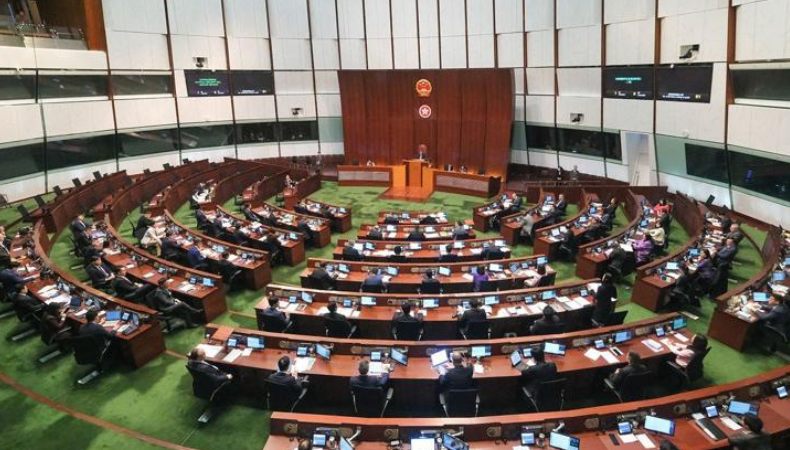Hong Kong widens crackdown powers, aligns closer with mainland China

Hong Kong’s Legislative Council unanimously approved far-reaching new powers on Tuesday, sparking concerns among critics and analysts about the alignment of the city’s national security legislation with that of mainland China.
The legislation, which was passed with unusual haste, is viewed as intensifying the crackdown on dissent in the financial hub. Critics and analysts warn that the rapid passage of the legislation, at the request of city leader John Lee, signals a significant shift towards stricter national security measures akin to those enforced on the Chinese mainland.
Content and Implementation of the Legislation
The extensive national security bill, spanning 212 pages in its initial draft, was expedited through the Legislative Council without opposition. Effective from the upcoming Saturday, the law introduces 39 new national security offenses, supplementing an already robust national security law imposed directly by Beijing in 2020 following significant democracy protests in the preceding year.
The legislation, known locally as Article 23, encompasses a wide range of crimes, including treason, espionage, external interference, and unlawful handling of state secrets. Notably, the most serious offenses carry severe penalties, including life imprisonment.
Implications for Hong Kong’s Society and Business Environment
The passage of this legislation has profound implications for Hong Kong’s society and business environment. While proponents argue that the new laws are essential for restoring stability after the 2019 protests, critics warn that the broad scope of offenses could stifle political dissent and curb civil liberties.
Moreover, the legislation’s severe penalties and ambiguous language raise concerns among legal experts and business leaders. Hong Kong, once known for its vibrant civil society and robust business environment, now faces the risk of further suppression and a decline in its reputation as a global financial hub. The rapid enactment of the law, coupled with its broad definitions, threatens to undermine the city’s autonomy and erode investor confidence.
Criticisms and Reactions
The passage of the national security legislation has drawn criticism from human rights organizations, business leaders, and political activists. They argue that the legislation represents a significant blow to human rights and Hong Kong’s unique identity.
Keep Reading
Amnesty International China director Sarah Brooks described the legislation as “another crushing blow to human rights in the city,” expressing concern about the rapid erosion of civil liberties. Similarly, business leaders worry about the impact of the legislation on Hong Kong’s business environment.
Johannes Hack, President of the German Chamber of Commerce in Hong Kong, voiced concerns about the legislation’s implications for the city’s unique position as a global financial center.
The swift enactment of the law has raised alarm bells both locally and internationally, highlighting the deepening divide between Beijing’s authoritarian rule and Hong Kong’s aspirations for autonomy and freedom.







